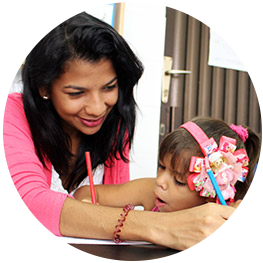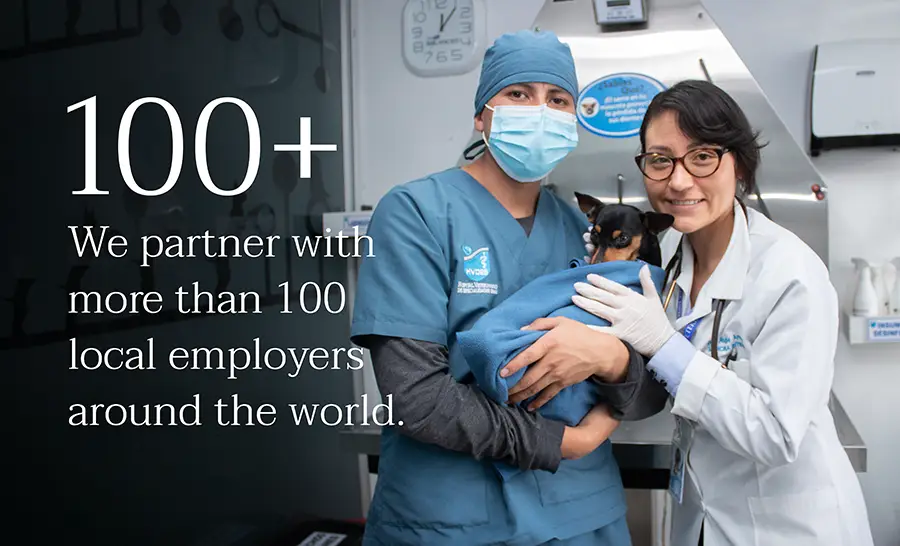What we measure
how we make sure our programs work

When it comes to creating lasting change, it takes dedication, passion and a lot of analysis. Statistics, research and rigorous follow-up go into every initiative we put in place. It’s how we know what’s working — and what’s not. Each year, we track progress and make modifications to build more effective and impactful programs for our children and youth.
Why we measure
Our programmatic approach is not a one-size-fits-all strategy for ending poverty. The programs we offer are contextualized, meaning they are adaptable and flexible enough for children's needs at different ages. We also adapt them to match with the most urgent needs and available services in the communities our families call home.
Sponsorship-supported interventions, like the ones offered through our programs, help children and teens meet developmental milestones, provide them with protective factors that may counteract later negative forces, and give them a chance to create lasting change in their lives.
HEALTH | EDUCATION | EMPOWERMENT | EMPLOYMENT
Measuring healthy behaviors
Beginning healthy behaviors early helps children and youth reduce their chances of facing preventable disease. We focus on healthy behaviors that have direct, proven results in reducing childhood illnesses and death, while also being simple enough to implement into their daily lives. The healthy behaviors we promote are identified as having the greatest positive effect on the lives of children and youth in our communities.

Medical &
dental health

Adolescent
health
When it comes to healthy behaviors, we measure:
- Improved attitude: You can know the facts but not believe they are relevant to your life. We measure how children and their caretakers feel about the healthy behaviors we’re encouraging before and after our programs. Do they believe those behaviors are important?
- Increased self-efficacy: Knowledge and attitude mean nothing without follow through. Sometimes children’s and caretakers’ environments hinder their ability to make healthy changes. Sometimes they just need confidence to carry on. We measure whether they believe they can maintain these healthy behaviors.
When it comes to the use of health services, we look at these results:
- Improved availability: Ensuring children can get to nearby providers when they are open and at times that work for their families.
- Improved affordability: Removing financial roadblocks for families so children can get the care they need.
- Increased accessibility: Educating families to help them understand when to see a health care provider and how to find the services they need.
Results in action

100,000
medical and
dental services
Medical & dental health
Your support helped ensure access to medical and oral care, paying for more than 100,000 medical and dental services – nearly 40,000 more than in 2021.

20,000
participated
in this program
ADOLESCENT HEALTH
Nearly 20,000 adolescents participated in our Adolescent Health Program, focusing on age-appropriate topics like disease and substance abuse prevention, contraceptive use and other important subjects to keep teens healthy.
Accessing care
Health and health equity are largely determined by the conditions in which children are born. Together with the disadvantaged families and other organizations we partner with, we are strengthening local health systems and assisting families in getting the care they need.
Offering both in-person care and telemedicine makes accessing health services much easier for families – resulting in a greater likelihood that they will seek and get the care they need. By the end of 2022, 84% of sponsored children and youth reported receiving services the last time they needed them.
- 63,148 telemedicine consultations were performed
- 38,781 telemedicine consultations were conducted.
Did you know?
The World Bank reports that, prior to the pandemic, more than half a billion people were pushed or further pressed into extreme poverty due to paying for health services out of their own pockets — a situation that’s become worse since then. This crisis halted two decades of global progress toward greater health equity.


When I grow up, I want to be a nurse so I can help little kids like me.”
— Clowie, Sponsored Child, Philippines
Measuring education
Without the foundation of an education, children can’t envision a life for themselves beyond their circumstances. Living in poverty, many children fall behind and often drop out of school, leading to a future of drugs, violence or chronic unemployment. Our programs provide resources, safe spaces to study and tutoring support to help children and youth reach graduation day.

TUTORING

Educational access
& technology

CONTINUED
LEARNING
When it comes to education, we measure:
- Increased secondary school completion: We measure success by identifying the percentage of sponsored Children International graduates who reach this milestone by age 24.
- Increased school enrollment:We measure the percentage of sponsored children who are enrolled in any level of formal education.
- Increased achievement of identified learning outcomes: We measure the percentage of sponsored children who achieve minimum proficiency standards for their age or grade level.

Results in action

92%
tutoring course completion rate
TUTORING
Our Academic Reinforcement Program increased student completion rates again in 2022. With 20,356 children and youth globally completing their tutoring program, we saw a 92% completion rate.

150,000
received support
to access programs
Educational access & technology
Nearly 150,000 children and youth received support to access school or CI programs in the form of material or financial support, internet/data plans, technology devices, transportation or educational aid, like school supplies. Computer literacy is now as important as reading and writing literacy; skills that are vital to a child's future success.

99%
of youth receiving
scholarships completed
their academic year
CONTINUED LEARNING
Our Continued Learning Program provides flexibility for agencies to respond to specific needs of the population and pilot different approaches to continuing education. 99% of youth receiving scholarships for secondary school completed their academic year, either graduating or advancing to the next grade level.
Did you know?
Globally, about two-thirds of children and young people (roughly 2.2 billion) do not have internet access at home, with significant inequalities observed by socioeconomic backgrounds, often resulting in diminished educational achievement.
Learn about education programs

Coming to the library has changed my life because, without the library, I would probably have been one of the drug abusers in the community. I have read books that discourage drugs and alcohol, and now I am even able to tell my friends to come to the library to study instead of smoking cigarettes and drinking alcohol.”
— Arnold, Sponsored youth, Zambia

Measuring empowerment
Many children and youth in our communities have never seen an example of someone finishing school, achieving their dreams or breaking free from poverty. It’s why empowerment is so important when we talk about giving children and youth the confidence they need to create lasting change in their lives. Empowerment programs give children hope for the future and important life skills, like problem-solving, creative-thinking, leadership and more.

YOUTH
LEADERSHIP

Emotional
well-being

SOCIAL
ACCOUNTABILITY
When it comes to empowerment, we measure:
-
Strengthened life skills, measured by the percentage of individuals who self-report having a strong competency in the long list of essential life skills as defined by the World Health Organization.
Life skills include: self-awareness, critical thinking, effective communication and more. -
Increased social responsibility, measured by data that identifies the percentage of individuals who self-report having a strong competency in social responsibility.
Social responsibility includes: Empathy, conflict resolution, valuing group work and more.

Results in action

17
community service
projects
YOUTH LEADERSHIP
Youth developed and implemented 17 community service projects in their neighborhoods in 2022, positively impacting entire communities across the globe.

62,376
participants
Emotional well-being
Participation in our Emotional Well-Being Program increased to 62,376 participants, with over 10,000 more children and youth and 1,411 more caregivers involved in 2022, compared to 2021.

800,000+
people helped
SOCIAL ACCOUNTABILITY
Children International’s Social Accountability Program helps communities hold their governments accountable for reliable, high-quality health services, utilizing a process that encourages all stakeholders to identify gaps in their local systems and identify solutions. In 2022, the program supported 33 government health facilities, providing access to more than 800,000 people in our partner clinics.
Did you know?
Studies have found that youth in developing countries who have higher levels of social development (like empowerment, positive self-identity and social skills) also show better outcomes in areas like employment, health and education.
Learn more about our empowerment programs


For me, Children International is a door to success. CI has had a great impact on me because it helped me grow as a leader. This program changes lives — it changed mine. I participated in almost all the programs here. Now, I am a volunteer, teaching the kids everything I learned.”-
— DAYANA S., CHILDREN INTERNATIONAL GRADUATE
Measuring Into Employment®

As the final piece of the puzzle for breaking the cycle of generational poverty, we work with young people to eliminate barriers between them and quality employment. Workshops teach aspiring youth vital job-readiness and career-applicable skills, résumé writing, mock interviews, job searching, job placement and more.



Did you know?
Since 2019, young people (aged 15–24) have faced serious difficulties in finding and keeping formal employment. More than 1 in 5 young people are not currently employed, being educated or in any formal training program.
Source: ILO/Sida Partnership on Employment, technical brief, 2019.
Learn more about Into Employment

Empowering youth to create a better life through access to education, health care and shelter is a focus for us. Working with Children International, we are able to make a contribution to create a long-lasting impact for kids and youth in places that need it most. Especially through awarding post-secondary scholarships, we can unlock their full potential and change their lives’ trajectories.”
— Roland, Children International board member, and Barbara Paanakker

Smart giving
In FY 2024, 83% of our total operating expenses supported programs for children and youth.
.






